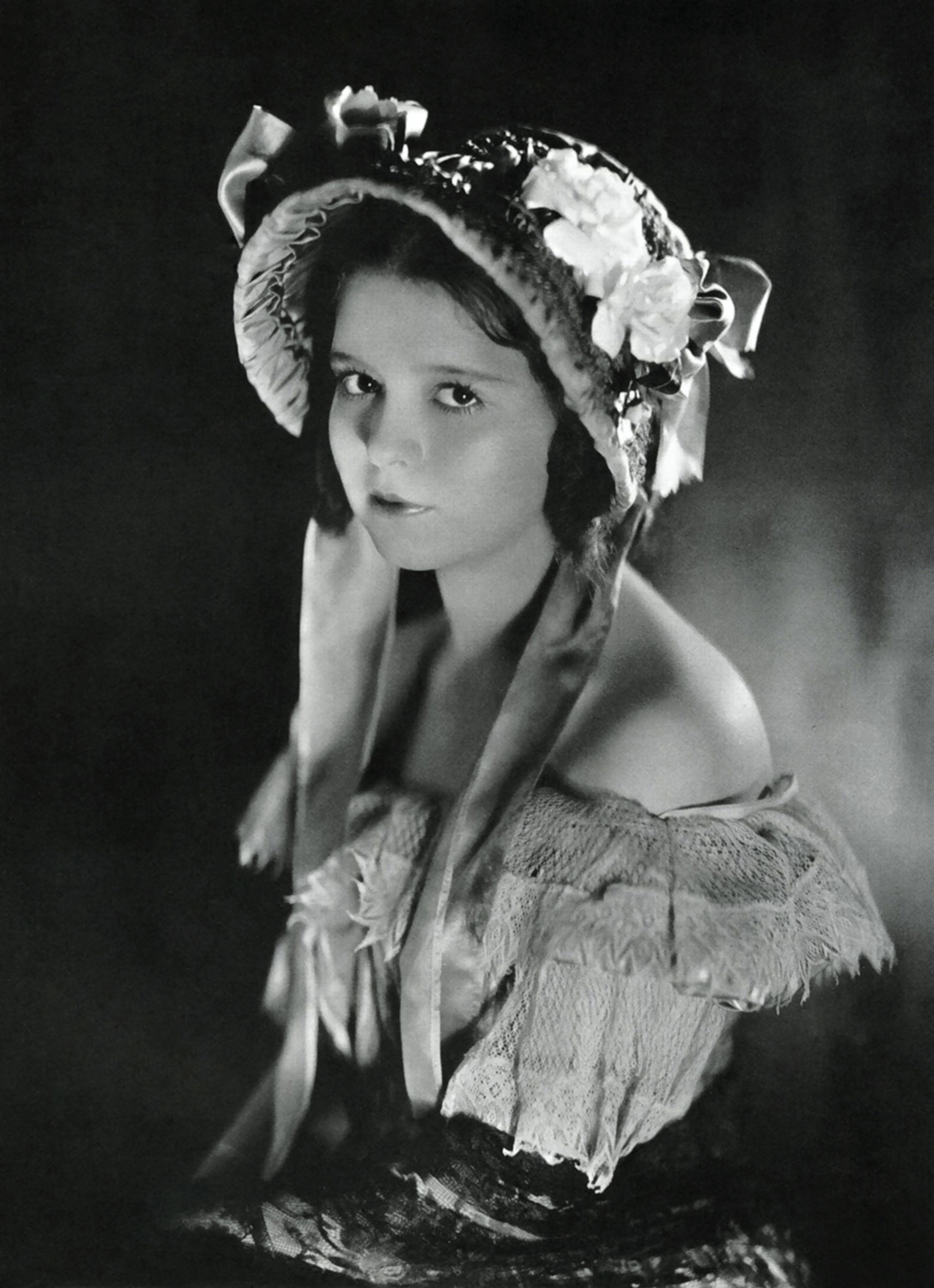Who Is Clara Bow, Taylor Swift's Inspiration for 'The Tortured Poets Department'?
Meet the original Hollywood "It girl" and Swift's latest historical muse.

Clara Bow, the original "It girl" of the 1920s, is the latest Old Hollywood figure to serve as a source of inspiration for Taylor Swift. For her eleventh studio album, The Tortured Poets Department, Swift named a song after the popular silent film actress, who rose to stardom just a few short years after her debut. Known as the first sex symbol of the Flapper Era, Bow starred in several box-office hits, including an early Oscar-winning movie, and faced intense tabloid scrutiny during her whirlwind career, which ended in early retirement.
Now that TTPD has finally arrived, read on to learn more about the late actress, including any possible connections she has to Swift and what Bow's living relatives think of the musical tribute.

Long before Taylor Swift named a song after her, Clara Bow was the original "It girl" of the 1920s.
She received her big break as a silent film actress after experiencing a rough childhood.
Clara Gordon Bow was born on July 29, 1905, in Brooklyn, New York, and was raised in a tenement slum by an abusive father and a violent, mentally ill mother. In an extensive 1928 interview with the magazine Photoplay, Bow recalled that she was often left taking care of her mother and the house while her mother suffered epileptic seizures and psychotic episodes.
As a teen, Bow fell in love with movies, and eventually entered a "Fame and Fortune" contest that helped launch her career. When Bow's mother learned that she wanted to be an actress, she told her daughter that she'd "rather see [her] dead." In 1922, the same year that Bow won her first acting role, she woke up in the night to her mother threatening to kill her with a butcher knife. Bow escaped, and her mother was institutionalized and later died in 1923.

Clara Bow, circa 1922, in a still from the movie "Down to the Sea in Ships."
After Bow's first role, in the 1922 film Beyond the Rainbow, the rookie actress took numerous jobs, filming 15 projects in 1925 alone. Per the BBC, she was known for her "big-eyed, baby-faced beauty" and for playing carefree, independent female characters. She also successfully made the transition from the silent-film era to the talking pictures; she starred in 57 movies total in her career, 11 of them talkies.
“She really came alive in front of the camera,” said Judith Mackrell, author of Flappers: Six Women of a Dangerous Generation. “When you watch her, you feel as if she’s doing something very spontaneous for you, so you’re having a relationship with her. That may be an illusion, but it’s a very powerful one.”
Her performance in the 1927 film 'It' inspired the term "It girl."
Among Bow's most famous movies (including 1925's The Plastic Age and 1927's Wings, the first movie to win the Oscar for Best Picture), Clarence G. Badger's 1927 silent film It cemented the actress's legacy. In the project, Bow starred as a quirky retail worker who wins the heart of the store's wealthy owner. The film coined the elusive quality of having "It," and offered multiple definitions, as the BBC explains: "At one point, the hero’s best buddy reads that 'the possessor of "IT" must be absolutely "un-self-conscious," and must have that magnetic "sex appeal" which is irresistible.'"
Stay In The Know
Get exclusive access to fashion and beauty trends, hot-off-the-press celebrity news, and more.
After the movie became a box office hit, countless fans began to know Bow via the moniker "It girl;" per the BBC, fan mail that was simply addressed to "Miss It, California" or "The It Girl" still somehow made it to her residence.

Clara Bow (as Betty Lou Spence) and William Austin (as "Monty" Montgomery") in the 1927 film "It."
Biographer David Stenn, who wrote the biography Clara Bow: Running Wild, also described her appeal to The Washington Post, describing her as "the first American sex symbol."
“Her characters always had a career, and for a generation of women who had never seen anything like this before, it changed their lives. She felt real to people," he told the outlet, later adding, “Women wanted to be her, and men wanted to be with her. She had a warmth and vulnerability that was appealing to everyone.”
She faced intense public scrutiny for her personal and romantic life.
Despite her quick ascendance to fame, Bow's Hollywood career was ultimately cut short. In the late '20s, at the height of her career, Bow was the subject of countless tabloid stories, as the outlets published both salacious rumors and true details of her personal life, with a special focus on her many romantic affairs. While Hollywood stars were expected to be discreet about their dating lives, she "plunged into romance after romance," per the Chicago Tribune, and papers accused her of exhibitionism. Of course, that attitude toward famous women still persists in some form today.
"Today we'd call it slut-shaming," Stenn said, speaking to Today. "This idea of an independent strong woman still poses a threat to many people in our culture, especially when she is gifted and has immense talent."

Clara Bow, circa 1929.
The biggest blow to Bow's career and reputation came at the end of 1930, when she parted ways with her hairdresser-turned-personal-secretary Daisy De Voe. De Voe managed the actress's money and personal affairs, and, per Los Angeles Magazine, the secretary allegedly stole $16,000 (worth over $222,000 in today's money) from Bow, as well as some of her jewelry and personal correspondence. The court case against De Voe, which was closely followed by the media, was believed to take a toll on Bow; in May 1931, she was admitted to the Glendale Sanatorium, and she made her exit from Hollywood soon after.
Clara Bow retired from acting in 1933 at age 28, after completing her final film, Hoop-La. She and her husband, actor-politician named Rex Bell (whom she married in late 1931) retired to Nevada and lived on The Walking Box Ranch, where they raised two sons. Bow continued to struggle with her mental health in retirement; per the National Museum of American History, she attempted suicide in 1944 and sought psychiatric treatment a few years later, where she was diagnosed with schizophrenia. In 1950, she moved back to Hollywood alone, estranged from Bell (though they never divorced), and she lived a private life until her death in 1965.

An autographed portrait of Clara Bow, circa 1925.
Her great-granddaughters "couldn't believe" Swift named a song after her.
It turns out that Clara Bow's living relatives learned about the actress's Tortured Poets Department shout-out along with the rest of the world. After the 2024 Grammys, the actress's great-granddaughters, Nicole Sisneros and Brittany Grace Bell, told People that they were "stunned" by the tracklist announcement.
“We could not believe it,” Sisneros said. “We were shocked and then the intrigue set in because no one from our family has been contacted or knew about this prior. We found out via the Instagram post like everybody else... [During her Grammy speech Swift] said she was working on this the past two years so [we] just want to know what prompted it and where the connection is coming from."
Sisneros also revealed that she reached out to Swift’s team but has yet to hear anything back.

Taylor Swift, onstage at the Eras Tour on August 9, 2023 in Inglewood, California.
The track "Clara Bow" is a huge moment for Sisneros and Bell (who are the granddaughters of Bow’s son Rex Bell Jr.), who are both mothers and longtime Swifties. They told People that they hope the song honors the “perseverance” of the late actress.
“I hope [Taylor] conveys a positive image of Clara Bow, which I think she will,” Bell said. “I would imagine that Taylor uses this as a way to highlight her accomplishments, her accolades, her talent. They're both people that have really strong raw talent.”
Quinci is a Culture Writer who covers all aspects of pop culture, including TV, movies, music, books, and theater. She contributes interviews with talent, as well as SEO content, features, and trend stories. She fell in love with storytelling at a young age, and eventually discovered her love for cultural criticism and amplifying awareness for underrepresented storytellers across the arts. She previously served as a weekend editor for Harper’s Bazaar, where she covered breaking news and live events for the brand’s website, and helped run the brand’s social media platforms, including Instagram, Facebook, and Twitter. Her freelance writing has also appeared in outlets including HuffPost, The A.V. Club, Elle, Vulture, Salon, Teen Vogue, and others. Quinci earned her degree in English and Psychology from The University of New Mexico. She was a 2021 Eugene O’Neill Critics Institute fellow, and she is a member of the Television Critics Association. She is currently based in her hometown of Los Angeles. When she isn't writing or checking Twitter way too often, you can find her studying Korean while watching the latest K-drama, recommending her favorite shows and films to family and friends, or giving a concert performance while sitting in L.A. traffic.
-
 Netflix's 'North of North' Transports Viewers to the Arctic Circle—Meet the Cast of Inuit Indigenous Actors
Netflix's 'North of North' Transports Viewers to the Arctic Circle—Meet the Cast of Inuit Indigenous ActorsThe new comedy follows a modern Inuk woman determined to transform her life.
By Quinci LeGardye
-
 Princess Beatrice's Husband Pays a Rare Tribute to These Royal Family Members on Instagram
Princess Beatrice's Husband Pays a Rare Tribute to These Royal Family Members on InstagramEdoardo Mapelli Mozzi shared some behind-the-scenes snaps from the F1 Grand Prix in Bahrain.
By Kristin Contino
-
 Allow Kathy Bates to Convince You to Grow Out Your Grays
Allow Kathy Bates to Convince You to Grow Out Your GraysOne look at her new style and you'll be canceling your root touch-up pronto.
By Ariel Baker
-
 Beyoncé Wins Best Country Album at the 2025 Grammys
Beyoncé Wins Best Country Album at the 2025 GrammysThe superstar is the first Black woman to ever win the honor.
By Quinci LeGardye
-
 Everything to Know About the 2025 Grammys, From How to Watch the Awards Show to the Performers
Everything to Know About the 2025 Grammys, From How to Watch the Awards Show to the PerformersAll of your favorite pop divas are set to take the stage.
By Quinci LeGardye
-
 The Most Genius Taylor Swift Easter Eggs Ever
The Most Genius Taylor Swift Easter Eggs EverShe's been sneaking them into her work since the beginning.
By Katherine J. Igoe
-
 Taylor Swift Had the Sweetest Dedication to Travis Kelce During Her VMAs Acceptance Speech
Taylor Swift Had the Sweetest Dedication to Travis Kelce During Her VMAs Acceptance Speech\201cEverything this man touches turns to happiness and fun and magic,\201d Swift said after winning the Video of the Year award.
By Sadie Bell
-
 Post Malone Lauds Taylor Swift for Directing the "Fortnight" Video While Winning Best Collaboration at the 2024 MTV VMAs
Post Malone Lauds Taylor Swift for Directing the "Fortnight" Video While Winning Best Collaboration at the 2024 MTV VMAsThe superstars gushed over each other while accepting the first award of the night.
By Quinci LeGardye
-
 Jack Antonoff Divulged That Taylor Swift Wrote "You're Losing Me" in 2021, And Swifties Are ~Losing~ Their Damn Minds
Jack Antonoff Divulged That Taylor Swift Wrote "You're Losing Me" in 2021, And Swifties Are ~Losing~ Their Damn MindsShe and Joe Alwyn didn't officially break up until 2023.
By Iris Goldsztajn
-
 Will the Real Taylor Swift Please Stand Up?
Will the Real Taylor Swift Please Stand Up?On social media, celebrity lookalikes are garnering fans and fame. But when you’re constantly being mistaken for someone else, it can change how even you see yourself.
By Olivia Messer
-
 The 41 Best Sad Songs of All Time
The 41 Best Sad Songs of All TimeA little wallowing never hurt anyone.
By Bianca Rodriguez